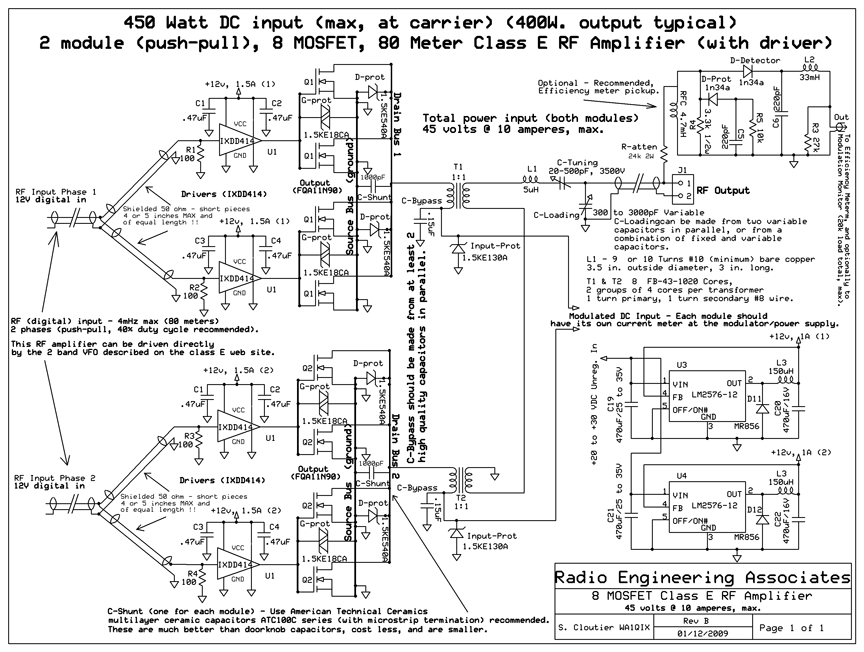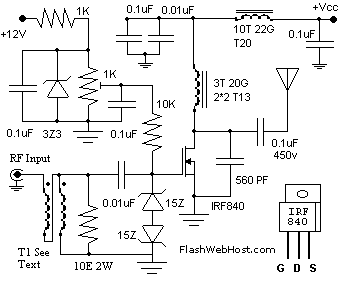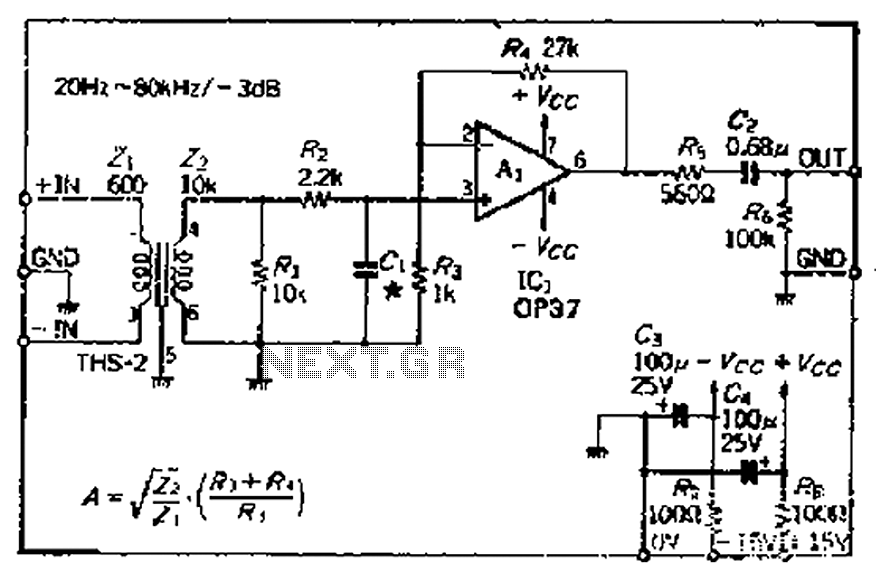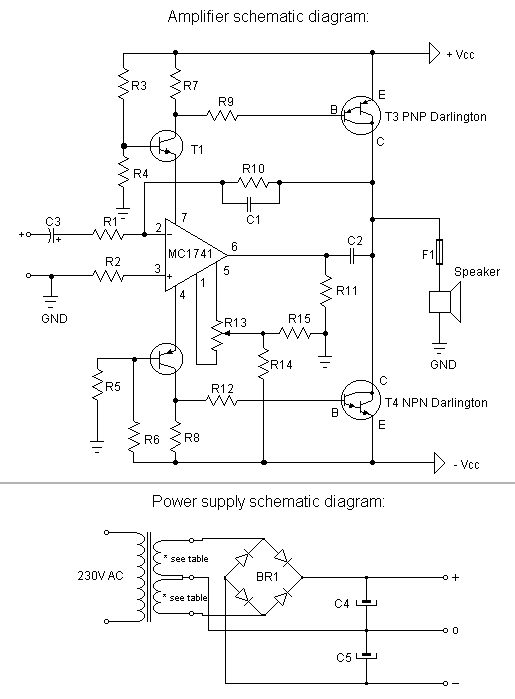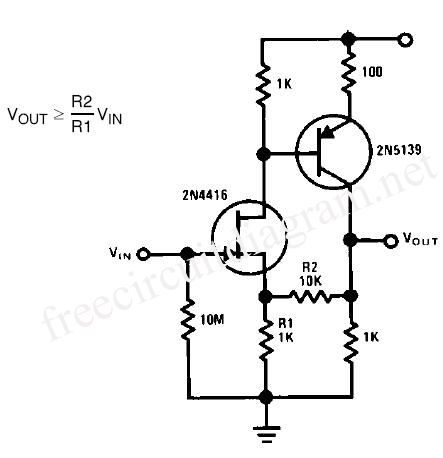
50W Hi-Fi amplifier with TDA7294
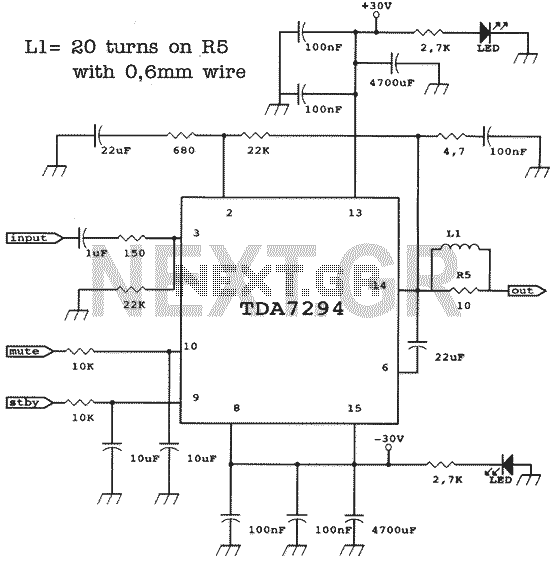
The TDA7294 is a Hi-Fi amplifier and can give 100W RMS but with 10% distortion. Supplying 30 Volts you can have 50 Watts RMS with 1% distortion. Frequency range start at 16Hz and can reach 100KHz. Make sure you are using good heatsink. The chip supports mute function as well. More: A symmetrical 30V power supply is all its need to power the unit.
The TDA7294 is a high-performance audio amplifier IC designed for Hi-Fi applications, capable of delivering 100W RMS output power at a distortion level of 10%. When supplied with a symmetrical voltage of 30V, the amplifier can provide a more refined output of 50W RMS with significantly reduced distortion at 1%. The operational frequency range of the TDA7294 extends from a low of 16Hz to a high of 100kHz, making it suitable for a wide range of audio applications, including home audio systems and professional sound equipment.
In terms of circuit design, the TDA7294 requires a well-designed power supply to ensure optimal performance. A symmetrical 30V power supply is recommended, which can be achieved using a transformer with dual secondary windings or a dedicated power supply module. The power supply should be decoupled with appropriate capacitors to minimize noise and ensure stability during operation.
Thermal management is critical when implementing the TDA7294. The IC must be mounted on a suitable heatsink to dissipate heat effectively. The heatsink size and design depend on the expected power output and ambient temperature conditions. Proper thermal design will help maintain the operational integrity of the amplifier and prevent thermal shutdown.
Additionally, the TDA7294 features a mute function, which allows for silent operation during power-up or when not in use. This function can be implemented using an external control circuit to toggle the mute pin, providing flexibility in usage scenarios.
Overall, the TDA7294 is a versatile amplifier IC that, when implemented with appropriate power supply and thermal management considerations, can deliver high-quality audio performance suitable for various applications.The TDA7294 is a Hi-Fi amplifier and can give 100W RMS but with 10% distortion. Supplying 30 Volts you can have 50 Watts RMS with 1% distortion. Frequency range start at 16Hz and can reach 100KHz. Make sure you are using good heatsink. The chip supports mute function as well. A symmetrical 30V power supply is all its need to power the unit. 🔗 External reference
The TDA7294 is a high-performance audio amplifier IC designed for Hi-Fi applications, capable of delivering 100W RMS output power at a distortion level of 10%. When supplied with a symmetrical voltage of 30V, the amplifier can provide a more refined output of 50W RMS with significantly reduced distortion at 1%. The operational frequency range of the TDA7294 extends from a low of 16Hz to a high of 100kHz, making it suitable for a wide range of audio applications, including home audio systems and professional sound equipment.
In terms of circuit design, the TDA7294 requires a well-designed power supply to ensure optimal performance. A symmetrical 30V power supply is recommended, which can be achieved using a transformer with dual secondary windings or a dedicated power supply module. The power supply should be decoupled with appropriate capacitors to minimize noise and ensure stability during operation.
Thermal management is critical when implementing the TDA7294. The IC must be mounted on a suitable heatsink to dissipate heat effectively. The heatsink size and design depend on the expected power output and ambient temperature conditions. Proper thermal design will help maintain the operational integrity of the amplifier and prevent thermal shutdown.
Additionally, the TDA7294 features a mute function, which allows for silent operation during power-up or when not in use. This function can be implemented using an external control circuit to toggle the mute pin, providing flexibility in usage scenarios.
Overall, the TDA7294 is a versatile amplifier IC that, when implemented with appropriate power supply and thermal management considerations, can deliver high-quality audio performance suitable for various applications.The TDA7294 is a Hi-Fi amplifier and can give 100W RMS but with 10% distortion. Supplying 30 Volts you can have 50 Watts RMS with 1% distortion. Frequency range start at 16Hz and can reach 100KHz. Make sure you are using good heatsink. The chip supports mute function as well. A symmetrical 30V power supply is all its need to power the unit. 🔗 External reference
